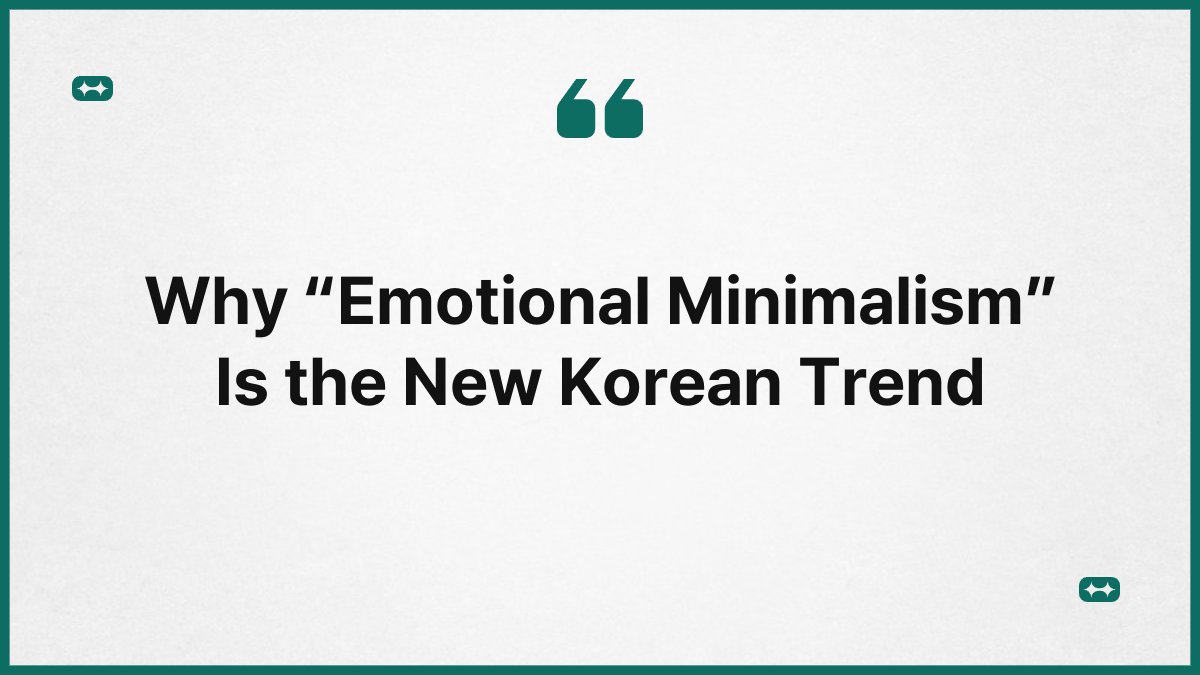[K-Bridge/Samuel] The concept of “Emotional Minimalism” has emerged as a significant trend in Korea, reflecting a shift towards simplifying emotional experiences and prioritizing mental well-being.
This movement emphasizes the importance of decluttering emotional baggage and focusing on what truly matters in life.
In a fast-paced society where individuals often feel overwhelmed by stress and anxiety, adopting emotional minimalism offers a pathway to greater peace and clarity.
By embracing this trend, people can cultivate healthier relationships with themselves and others, leading to a more fulfilling life.
In this article, you will discover the principles of emotional minimalism, its cultural significance in Korea, and practical ways to implement it in daily life.
You will also learn about its psychological benefits and how it can transform your emotional landscape.
The Essence of Emotional Minimalism
Defining Emotional Minimalism
Emotional minimalism is a philosophy that encourages individuals to simplify their emotional lives by letting go of unnecessary feelings and attachments.
This approach is rooted in the idea that emotional clutter can lead to stress and dissatisfaction.
By focusing on essential emotions and experiences, individuals can cultivate a sense of clarity and purpose.
This philosophy aligns with the broader minimalist movement, which advocates for reducing physical clutter to improve overall well-being.
Cultural Context in Korea
In Korea, where societal pressures and expectations can be overwhelming, the rise of emotional minimalism represents a cultural shift towards prioritizing mental health.
Traditionally, emotional expression has often been suppressed in favor of conformity and social harmony.
However, as awareness of mental health issues increases, more individuals are seeking ways to express their emotions authentically.
Emotional minimalism provides a framework for navigating these complexities while fostering a healthier relationship with one’s feelings.
Benefits of Embracing Emotional Minimalism
Adopting emotional minimalism can lead to numerous benefits, including reduced anxiety, improved focus, and enhanced relationships.
By decluttering emotional experiences, individuals can better understand their true feelings and needs.
This clarity allows for more meaningful connections with others, as people become more attuned to their emotions and those of their loved ones.
Ultimately, emotional minimalism promotes a more balanced and fulfilling life.
The Psychological Benefits of Emotional Minimalism
Reducing Anxiety and Stress
One of the most significant advantages of emotional minimalism is its ability to reduce anxiety and stress.
When individuals learn to let go of unnecessary emotional burdens, they often experience a sense of relief.
This process involves recognizing and addressing emotions that no longer serve a purpose.
By releasing these feelings, individuals can create mental space for positivity and growth.
Enhancing Self-Awareness
Emotional minimalism encourages greater self-awareness, allowing individuals to reflect on their emotional responses and triggers.
This heightened awareness can lead to better emotional regulation and decision-making.
As people become more in tune with their feelings, they can identify patterns in their emotional experiences, leading to personal growth and improved mental health.
Fostering Resilience
By simplifying emotional experiences, individuals can build resilience in the face of challenges.
Emotional minimalism teaches individuals to focus on what truly matters, enabling them to navigate difficulties with a clearer mindset.
This resilience fosters a sense of empowerment, as people learn to embrace their emotions without being overwhelmed by them.
Practical Steps to Implement Emotional Minimalism
Identifying Emotional Clutter
The first step in embracing emotional minimalism is identifying emotional clutter.
This involves reflecting on feelings and experiences that no longer serve a purpose.
Individuals can benefit from journaling their emotions, allowing them to recognize patterns and prioritize their emotional landscape.
By acknowledging these feelings, they can begin the process of letting go.
Setting Boundaries
Establishing boundaries is crucial for emotional minimalism.
Individuals must learn to say no to situations and relationships that drain their emotional energy.
This practice fosters healthier interactions and allows individuals to focus on relationships that bring joy and fulfillment.
By prioritizing their emotional well-being, individuals can create a supportive environment for personal growth.
Practicing Mindfulness
Mindfulness practices, such as meditation and deep breathing, can enhance emotional minimalism.
These techniques encourage individuals to be present with their emotions without judgment.
By cultivating mindfulness, individuals can develop a deeper understanding of their feelings and learn to respond to them more effectively.
This practice fosters emotional clarity and promotes a sense of peace.
The Role of Technology in Emotional Minimalism
Digital Detox
In an increasingly digital world, technology can contribute to emotional clutter.
Engaging in a digital detox allows individuals to disconnect from social media and online distractions.
This break can lead to improved mental clarity and emotional well-being.
By reducing screen time, individuals can focus on real-life experiences and relationships that matter.
Mindful Consumption of Information
Emotional minimalism encourages mindful consumption of information.
Individuals should evaluate the content they engage with and its impact on their emotional state.
By seeking out uplifting and positive content, individuals can create a more supportive emotional environment.
This practice fosters a sense of empowerment and encourages a healthier relationship with technology.
Utilizing Apps for Emotional Well-Being
Various apps are designed to support emotional well-being and mindfulness.
These tools can assist individuals in tracking their emotions, practicing mindfulness, and setting personal goals.
By integrating technology mindfully, individuals can enhance their emotional minimalism journey and cultivate a more balanced emotional landscape.
Emotional Minimalism in Relationships
Prioritizing Meaningful Connections
Emotional minimalism encourages individuals to prioritize meaningful connections over superficial relationships.
This shift allows for deeper emotional intimacy and understanding among loved ones.
By focusing on quality rather than quantity, individuals can foster relationships that bring joy and fulfillment.
Effective Communication
Clear and honest communication is essential in cultivating emotional minimalism within relationships.
Individuals should express their feelings openly and encourage their loved ones to do the same.
This practice fosters emotional transparency and strengthens connections, allowing for healthier interactions.
Letting Go of Toxic Relationships
Emotional minimalism involves recognizing and letting go of toxic relationships that drain emotional energy.
Individuals must evaluate their relationships and identify those that are harmful or unfulfilling.
By distancing themselves from negativity, individuals create space for healthier, more supportive connections.
The Impact of Emotional Minimalism on Mental Health
Alleviating Depression
Emotional minimalism can play a significant role in alleviating symptoms of depression.
By simplifying emotional experiences, individuals may find it easier to cope with feelings of sadness and hopelessness.
This approach fosters a sense of empowerment, as individuals learn to navigate their emotions more effectively.
Promoting Positive Mental Health
Adopting emotional minimalism can lead to overall improvements in mental health.
By focusing on essential emotions and experiences, individuals can cultivate a more positive outlook on life.
This shift promotes resilience and encourages individuals to embrace their emotions without fear.
Encouraging Professional Help
Emotional minimalism does not replace professional mental health support.
Instead, it complements therapeutic practices by providing individuals with tools to manage their emotions effectively.
Seeking professional help can enhance the benefits of emotional minimalism, leading to a more comprehensive approach to mental well-being.
The Future of Emotional Minimalism in Korea
Growing Awareness and Acceptance
As awareness of mental health issues continues to grow in Korea, emotional minimalism is likely to gain further acceptance.
This trend reflects a shift towards prioritizing emotional well-being and authenticity in a society that has traditionally emphasized conformity.
As more individuals embrace this philosophy, the collective approach to mental health may evolve.
Integration into Daily Life
Emotional minimalism has the potential to be integrated into daily life practices, such as workplace culture and education.
By fostering environments that prioritize emotional well-being, individuals can cultivate healthier relationships and improve overall mental health.
This integration can lead to a more supportive society that values emotional clarity.
Global Influence
The trend of emotional minimalism is not limited to Korea; it has the potential to influence global conversations about mental health and emotional well-being.
As individuals worldwide seek ways to simplify their emotional experiences, the principles of emotional minimalism may resonate across cultures, fostering a more compassionate and understanding global community.
Conclusion
Emotional minimalism represents a transformative approach to navigating the complexities of modern life.
By simplifying emotional experiences and prioritizing mental well-being, individuals can cultivate healthier relationships with themselves and others.
This trend offers a pathway to greater clarity, resilience, and fulfillment, making it a valuable philosophy for those seeking to enhance their emotional landscape.
As awareness of emotional minimalism continues to grow, it has the potential to shape cultural attitudes towards mental health, fostering a more supportive and understanding society.








